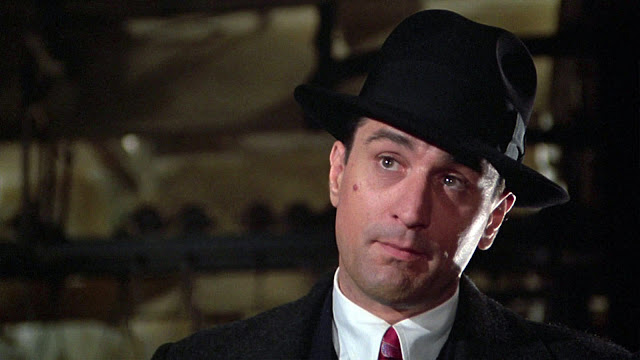Once Upon a Time in America
To me, 1984's ONCE UPON A TIME IN AMERICA is an odd, disjointed curiosity of a movie, even at its proper nearly four hour running time. I'm not sure why I waited so many years to finally watch it. This one is clearly "up my alley." Lengthy gangster saga? I should've dove into it during its numerous runs on HBO back in the '80s. Maybe I had some sixth sense about it. It is one of those films that seems off from its earliest moments. You may not be sure just why, at least at first. Is it the feeling that we've joined a story in its second or third act? That we missed something?
Co-writer/director Sergio Leone intended his opus to be six hours, split into two three hour movies. I read that he shot about ten hours. There are no less than eight screenwriters credited, and almost always this is a red flag. Too many cooks, too many differing takes. How could Leone cohere so many story threads into a workable movie?. He just couldn't. This tale is too big. That's why I feel that anything less than his original intention was doomed to fail.
To make matters worse, the film was edited down to two hours and twenty minutes for its American theatrical release. I haven't seen that version, and can't imagine what a mess it must be. Confusing, too. The four hour cut feels like a disorganized rummage sale of beautiful artifacts of intrigue that somehow don't all fit in the same room.
The film, which follows a ruthless, yet thoughtful gangster named David "Noodles" Aaronson, takes place in early '20s, early '30s, and late '60s New York City. Not in that order, at least in the four hour cut. Leone uses a non-linear style that has become more common in recent decades. Maybe that's in part why Tarantino is such a fan. I tend to like this approach, but here it just feels like we're watching a collection of scenes slammed together. This is a sprawling, complex story of a group of Jewish boys on the Lower East side who become successful hustlers early on and make a pact to share their earnings for life. Then the Depression happens. Perhaps more forebodingly, grand plans are drawn to rob the Federal Reserve.
I followed the story well enough, and I'm fairly certain I understood most everything. Nino Baragli's editing to blame? The within scene cuts are fine. But between scenes we see abrupt transitions and character behavior, often not logically following what came before. Characters are introduced and maybe seen all too briefly later. Joe Pesci's role is a case in point. His second scene feels like part of something left on the cutting room floor. This shoulda been a miniseries.
Robert DeNiro's Noodles is also a frustrating engima. We get plenty of him, but I never felt like I knew him. Or what drove his character's (often despicable) behavior. The actor again does some really fine work, as does James Woods as his childhood pal/partner in crime Max. The cast also includes Burt Young, William Forsythe, Danny Aiello, Treat Williams. Each gets at least one key moment, but there needed to be so much more. As for the women, Tuesday Weld gets a meaty part as a gang floozy, but Elizabeth McGovern's role as Deborah, the woman for whom Noodles pines most of his life, is more thankless. Her scene with DeNiro in the back of a car is especially vile and protracted.
ONCE UPON A TIME IN AMERICA's strengths are Leone's painterly direction, beautifully captured by Tonino Delli Colli's cinematography. Many shots look like artworks, paintings. Not only that of the famous bridge, but even drab interiors are beautiful. An incredible amount of care went into every second of film. If any movie is indicative of "director's medium", this is it. And Ennio Morricone's emotional score is justifiably celebrated, if a wee bit over praised. But the frustration I felt with the narrative keeps this one from joining the ranks. There is much greatness within, but in the end, this is a GODFATHER-type wannabe epic. I do have to say that Noodle's final conversation with Max is worthy of Corleone comparison.
And with much reflection and a rewatch, I have considered why this film feels so disorganized. It stems from a theory that much of what is seen in this movie is part of someone's opium dream. The editing therefore may be an attempt to mimic the fragmented nature of memories, dreams, and maybe even hallucinations.




Comments
Isn’t it freakin December??? October is overflowing with horror programs yet December gets one Christmas movie. And not even a Christmas movie you like. It is a sad state of affairs, I say.
Check back on the 22nd.